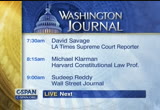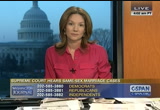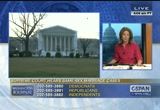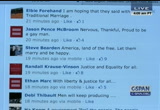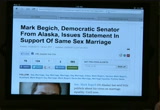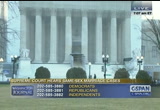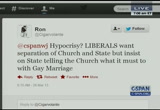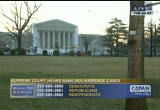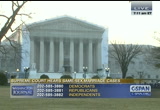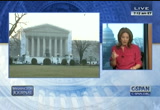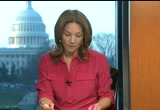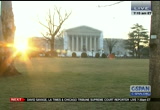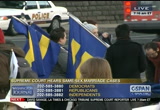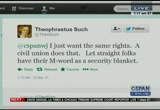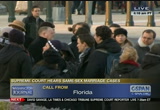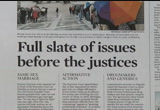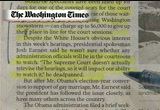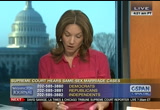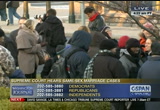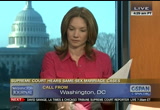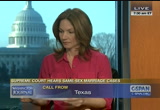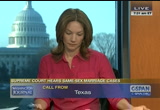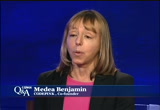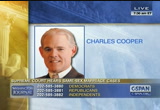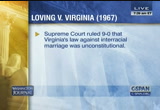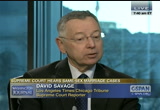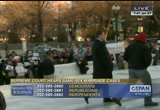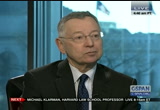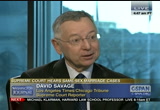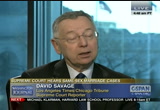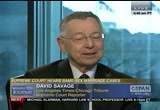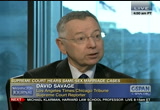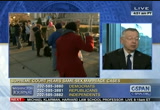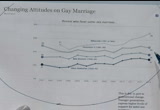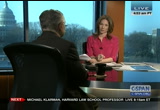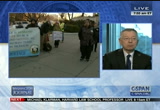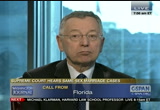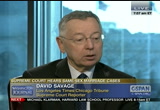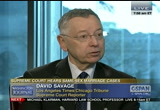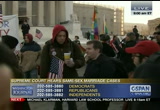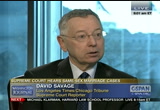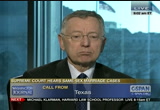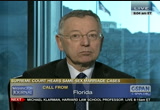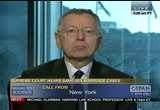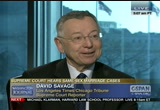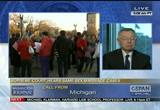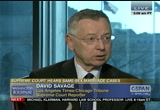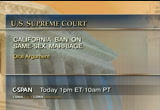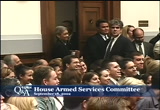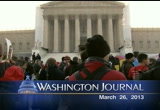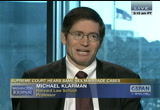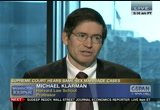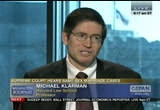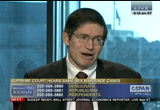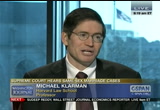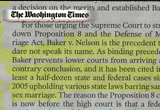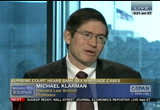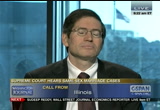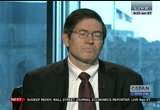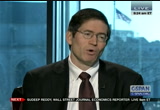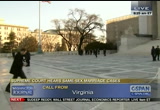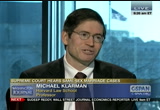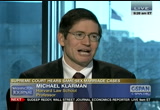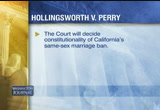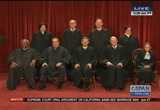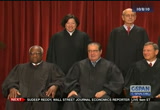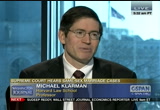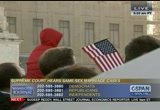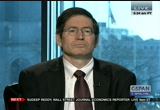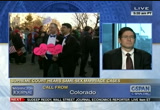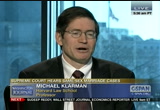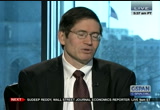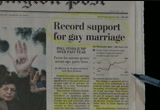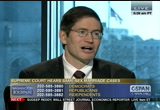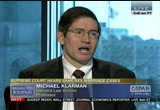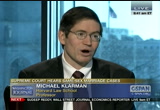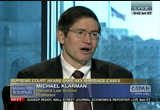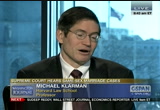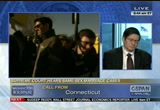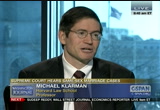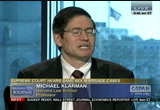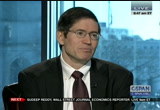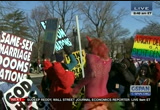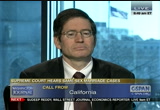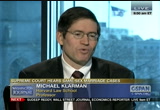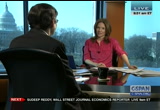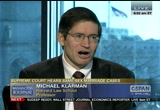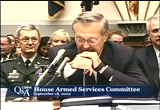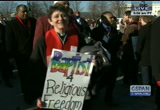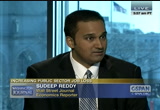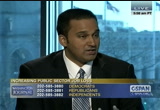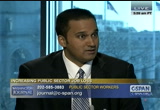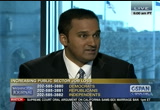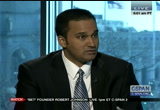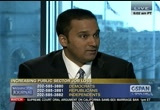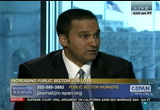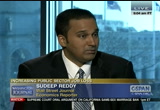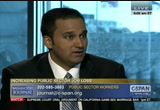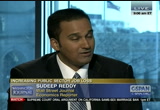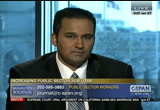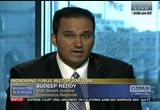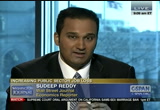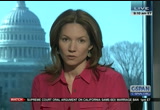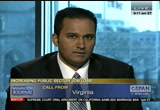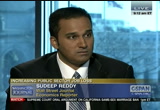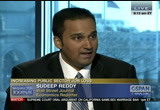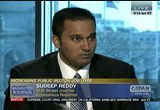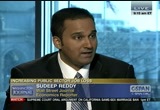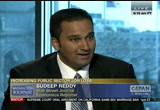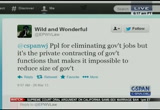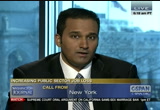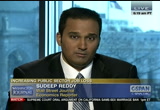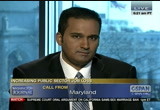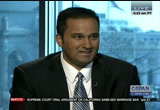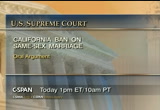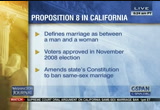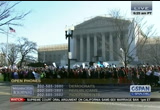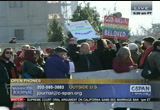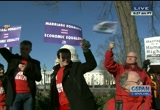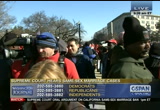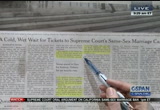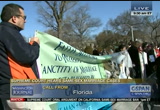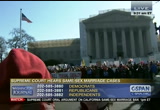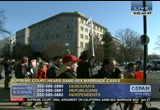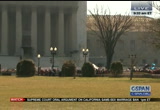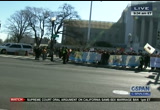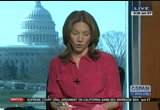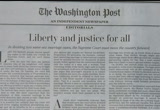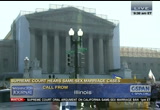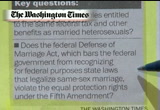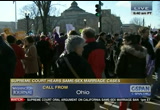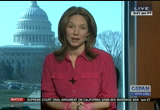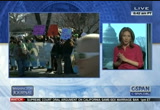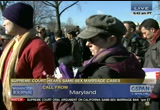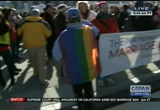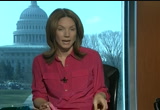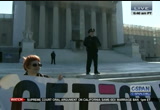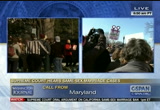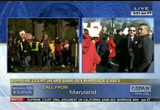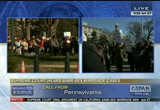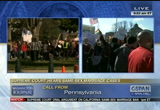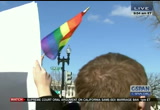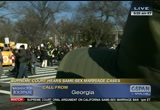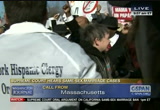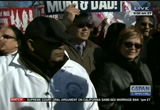tv Washington Journal CSPAN March 26, 2013 7:00am-10:00am EDT
7:00 am
andnal" discusses budgets the economy. "washington journal" is next. ♪ host: good morning. tuesday, march 26, today in washington, the supreme court begins to examine the issue of same-sex marriage. california's proposition 8 which defines men between one man and one woman. and wednesday, the court hears arguments on the defense of marriage act from 1996. with congress out on recess, a lot of focus on the first ever review of same-sex marriage. the line into today's oral arguments began last week, with people waiting outside in snow to get one of the 60 reserved seats. today, the roby protesters on
7:01 am
both sides of the issue. we will spend the first two hours previewing the cases and getting your take on the issue. democrats -- republicans -- independents -- send us a tweet. go to twitter doubt, -- twitter.com. facebook.com/cspan. we will begin with proposition 8, the case that will be before the court today. here is the washington times from yesterday about the key questions in that case of hollingsworth versus perry. this is what it says --
7:02 am
those are the constitutional questions before the court today and tomorrow when oral arguments, and to go same-sex marriage cases. we're getting your take on that. let's go to chuck in west virginia. caller: good morning. thank you for taking my call. i keep on hearing people and reading columns by people saying at if the supreme court grants marriage equality to law- abiding tax paying gay couples
7:03 am
in the united states that it is an attack on marriage that is going to destroy marriage. nothing is happening to traditional marriage for people who are straight or heterosexual. continue, theyto will continue to date, to get engaged, they will marry, and they're going to build their lives and families together still. none of that is going to change when gay couples are allowed to do the same. the fact is that throughout the nation's history, gay couples and gay individuals have been paying their taxes, and by paying our taxes, we help support all the legal benefits and protections of marriage. according to the government accountability office, there are over 01100 legal benefits and protections that are given to married couples. we have been subsidizing those throughout the nation's history.
7:04 am
yet we are unable to take advantage of those same incentives to marry. that cannot be constitutional. host: let me ask you this. should the court be jumping in at this point? one of the arguments being made by the lawyers for proposition 8, today's oral argument, is that there is a social movement happening. polls are showing more people in favor. let that take place. let states decide what they want to do. is there a role for the supreme court? caller: of course there is. this cannot be accomplished in a piecemeal, state-by-state basis. most of the legal benefits of marriage come from the federal government. but me give you an example -- say you have a straight couple, from any state, they go to las vegas, they have a fun weekend
7:05 am
in las vegas, they get married by an elvis impersonator and come home. that marriage is automatically honored in all 50 states. you take a gay couple in iowa who are legally married in iowa, and out of economic necessity, they have to relocate south to missouri where their marriage is not recognized. do they automatically become on married? do they lose the federal benefits under tax law and social security? how could that be constitutional? host: on facebook -- --on rights allen in colombia, maryland. what do you think? caller: i do not personally have a problem with allowing these
7:06 am
freedoms. rules federal government with restrictions, i think i disagree with states choosing. we've got to get over. there are more important things to be talking about. for instance, he want to talk .bout equity the wall street banks, they are getting away with murder. why are we not taxing them? there are trillions of dollars of revenue that we should have to balance the budget. host: all right. this is the huntington post this morning with this headline --
7:07 am
thomas in granite falls, north carolina, a republican. caller: good morning. i think this is another nail in the coffin for the united states. one of these days, we will have to answer for it. it is not right. i do not care who says what. it seems like the democratic party has become a party right out hail, if you look at -- hell, if you look at it.
7:08 am
it doesn't matter what the people really think. one of these days, we will have to get an account for it. the matter what we think, we will go before god to have an account for this. host: sarah in ohio, an independent. caller: my opinion is that the simplest way to think about this is the separation of church and state. once to take the element of the religious definition of marriage out, there should be no better reason for denying a marriage contract to two people and of the same-sex than 49 real-estate contract for two people of the same sex. host: on twitter -- we'll go to fred in washington, an independent. caller: thank you.
7:09 am
i really agree with the last caller. --ouple of other things protecting minority rights. i am not gay. so what. that is not any of my business. i do not have a problem with churches not approving it. i think it is none of their business. not allowing them in their church and disapproving of that, that is perfectly ok. with somebody's federal rights under the constitution i think is just plain totally wrong. in theirfree to preach pulpit. it is basically discrimination and violation of minority rights in this country. this country was not founded on
7:10 am
the principles of all. host: mike on twitter agrees with you -- we have been showing you live shots of the supreme court this morning with people lining up to get in this morning. they started last week. today begins two days of oral arguments on two separate same- sex marriage cases. arguments begin at 10:00 on proposition 8, and same-day audio will be released by the court. we will begin our coverage at about 1:00 p.m. eastern time. that is when the court will release the audio, around 1:00 p.m. three -- p.m. you can also listen online at c- span.org or on your smartphone by down like it -- downloading the free app.
7:11 am
live tv or radio, at the top left-hand corner, you can find for free c-span radio today's oral to arguments and wednesday's as well. marsha in texas, a democratic caller. caller: hello. what i wanted to say is that the people who are against same-sex marriage have never been able to show any reason to be against same-sex marriage. they've never been able to show out can -- how it can harm them. the only people whose business it is are the people who are marrying each other, the who and the houma. -- the whom. host: have you changed it yourself on this issue? have you always have that position? caller: i have always had that position. i have never changed.
7:12 am
i believe people should have the same rights. if the government is in the marriage business, it should be open to everybody, every citizen. it is not right for gay people to be paying their taxes and being treated on equal to heterosexuals. the congress when and president clinton signed the defense of marriage act, what did you think? did you follow that debate? caller: i did follow that. i was appalled at that. host: were you upset with president clinton? withr: yes, i was upset congress and president clinton. that never should have happened. host: about that signing, the front pages. of new york times --
7:14 am
next to that is a picture of then president clinton and first lady hillary clinton. that night on saturday september 21, returning to the white house after a full day on the campaign trail. let's go to brandon, delaware, an independent. good show. you have a lot of good people calling in. i personally feel that it should be a separation between church and state. the state should not be able to i should beurch -- able to marry who i want to marry. people go to preachers for counseling before they get married. if the preacher deems that they should not get married for whatever reason, he does not have to marry them. he feels that he does not want
7:15 am
to marry a same-sex couple, because they are the same sex, he feels that may damage the child's psyche or for whatever reason, he should not have to marry them. in that statess do not pay attention to the church. when we stop listening to god, that mrs. everything up. --- messes everything up. host: william, maryland, an independent color. the core ofaller: the issue is whether or not same-sex marriage is an issue of constitutional right or a legislative accommodation. and the reason i say that is because if it is a civil right, which is what they're trying to argue, is that it comes into my
7:16 am
beliefs as a catholic. as a catholic, the catholic church wants to provide services to people such as adoption. in states where that is a civil right as opposed to an accommodation, it has prevented the church from filling out its obligation to help society by finding homes for children. when people say, the gay marriage does not affect other people, it does if you look at it as a civil right versus on accommodation. with regard to the tax issue, they are complaining now, these two women are paying an awful lot of tax. years they've 30 not been able to file as married, they saved a lot tax. you cannot have it both ways. to edith are referring windsor in the defense of marriage act case which will be taken up on wednesday. here is the christian science monitor --
7:17 am
7:18 am
construction projects to go on in the united states, we require their to be environmental impact study to see if it will harm the least creature's among us. we do not seem to want to do any environmental impact study to see how a homosexual marriage will impact our children. in terms of the religious issue -- host: the d.c. the news last week that the pediatric association came out and said that they do not see any harmful effects on children? caller: i did see that. there is another pediatric association that took exactly the opposite stand, which shows that all of this is politically motivated. they are all subject to pressure from various groups. either literally or two pediatric groups that took a totally different sides of the issue. host: what you think about the court using things like social science in their determination?
7:19 am
caller: i think it is important. science has never determined how one acquires, sexual orientation. i do not think any heterosexual parents with children if given the choice to what, such lobby for their children -- if it is the majority of us would want this cultural tsunami to stop because we do not want this for our kids. host: the atlanta journal constitution -- the miami herald -- then here is the "chicago tribune" --
7:20 am
7:21 am
of course, many of you know that c-span2 has asked to have cameras in the courts repeatedly over the years. that is from the washington times this morning. this is from the baltimore sun -- it says here -- then it says that several people on line -- in line or being paid. one washington company charges $36 per hour. another $50 per hour for people to hold places and get tickets for clients. there is a line extending.com
7:22 am
company -- linestanding.com company that holds places in line. --ther piece that is a little bit about all those people who have been standing in line since last week to get in to today's and tomorrow's court proceedings. we're talking about the supreme court hearing same-sex marriage cases, getting your take on that. eric in new york, democratic caller. caller: good morning. it amazes me how republicans --
7:23 am
we know they do not recognize science at any time, but it seems funny how they want to recognize signs and try to bar somebody else from having a civil right. we know they hired think tanks to come up with these things anytime i hear the word state rights, all i can think about is slavery and how they want to deny people equal rights as blacks. when they talk about states' rights, they do not care about states' rights like how new york has a prohibition on certain gun activities now. they want to take new york to court for those same rights. they do not recognize its rights. the only recognize it when it is applicable to them, when it benefits them. north dakota, they want to bar abortions now. we were a judeo-christian nation. one has a right to their own religion. host: i'm going to leave it there.
7:24 am
the front page of the washington times -- our cameras will be there on the supreme court steps throughout the morning. our coverage begins at 1:00 p.m. eastern time when the court releases the audio sometime between 1:00 and 2:00. the protests as well, those on both sides of the issue. to see all of our coverage, go to our web site c-span.org. on twitter -- he and others can listen with c- span2's free radio app if you go to our web site c-span.org. take a look at the map. here is the legal patchwork that the courts will be grappling with. the federal government does not recognize same-sex marriage under the defense of marriage act, but the issue has been percolating in the states.
7:25 am
since may 17, 2004, and massachusetts became the first eight to make marriage legal for same-sex couples, other states have followed. here is a rundown of the same- sex marriage legislation. the states in read -- in red are those that have banned it. there are nine states and washington d.c. where gay marriage is legal. there is the legal patchwork of the map. we will go to jean in spring taxes, a republican a caller. republicantexas, a caller. caller: i do not understand why a sexual preference that is is onal, to say the best, the legislation of the supreme court. ago got beat up because they thought it was a mental problem. they changed their mind. there have been at least 30
7:26 am
studies out there that kind of hormone or gene out there that causes homosexuality. i'm left with the assumption that it is a choice. it is an abnormal choice. there is a man and woman. host: those were gene spots. -- gene's thoughts. here are a couple of front pages -- tim johnson has a press conference today in south dakota, the chairman of the senate banking committee, he severed a brain hemorrhage in 2006. he won reelection in 2008, sometimes using a motorized scooter. he is the fifth democrat to step aside for term in 2014, joining carl levin, tom harkin, jay
7:27 am
rockefeller, and frank lautenberg of new jersey. those are the south dakota papers for you. watching immigration ad campaigns, this was posted at 5:30 -- that follows as president obama yester day was at a naturalization ceremony. a headline in the washington post -- that is the washington post reporting on that. overseas, secretary of state john kerry meeting with afghanistan's president hamid
7:28 am
karzai and the headline -- the washington times reporting on their front page that background checks have soared since the newtown, connecticut shooting. the new york post has the story, along with other stories -- nra robocalling has been happening in the city of newtown, connecticut. it goes on -- will be making his first public speech this week, actually today. "the new york times" --
7:29 am
this is a story that broke yesterday. michele bachmann, a republican from minnesota, a presidential campaign is being investigated by the congressional ethics committee. that is a story that broke yesterday here on abc's web site. we will but to date in washington, d.c., a republican caller. what is your take on the same- sex marriage cases at a court? caller: i wanted to address the last caller and used the word republicans. i myself am a pretty staunch conservative in most aspects. i find that i have no objection to the marriage at all. i totally disagree with people that make the widespread statement of republicans do this, republicans do that. i'm also an environmental kirk optional in the field. a lot of conservatives cannot
7:30 am
lead in global warming-- do not belive in -- believe in global warming. host: reince priebus says that he could see that the next presidential contender for the republicans is in support of gay marriage. caller: that is absolutely going to have to be the case. we've had such a weak party. particular.n whether we have marco rubio, paul ryan, at any of those new faces in the crowd, we are going to have to show strong support for the gay community. host: linda in texas, a democrat. caller: i'm so glad the court is going to hear these cases and decide on the constitutionality of the issue. before this, as a gay person, a disabled veteran and a lawyer, i felt like it has been taxation without representation, to a
7:31 am
certain degree. i would pay for the juvenile court systems. we pay for the divorce court systems with our tax dollars. allay for many programs, kinds of tax programs with people with children and husbands, wives, and families. we get no benefits from them whatsoever. earned for my service to this country through the '70s the right to buy a home with a va loan. i cannot buy one with my female partner because of doma. i was cheated on that, i felt like. it was wrong. as far as studies for children, there are a lot of them out there. the texas state park did a study on them and found that children are actually better adjusted and they have more empathy for other people as a matter of fact. host: linda, we will keep having
7:32 am
7:33 am
mr. secretary, we're going to put them down. [laughter] mr. chairman, as i listen to it struck mets, what a wonderful thing free speech is. >> that was the hearing were donald were installed was making the justifications for attacking iraq. what you did not hear were questions that we got a chance to ask him, which is, how much money is halliburton going to make? how many u.s. soldiers will be killed? how many iraqi civilians will die from this adventure? i would like those questions answered by somebody like donald reinfeldt. -- rumself. na -- "q&a" on sunday at
7:34 am
8:00 eastern. >> our coverage on c-span continues as the supreme court takes up two days of oral arguments on same-sex marriage cases, two separate cases. you're looking at a live shot outside the supreme court. people have started to make their way into the court, lining up as early as last week to get one of the coveted public seats that are offered to hear these cases in real time. the courts of course later will be releasing the audio. no cameras are allowed. our coverage begins here on c- span at 1:00 p.m., and you can also listen on radio with the three -- the free app through your smartphone if you go to our web site at c-span.org. david savage is here on set with us.
7:35 am
let me begin with today's court case. what is proposition 8, and how did it make its way to the court? guest: it is a long story. it goes over 10 years. some people in california sued, tried to win same-sex marriage. they want a book for the california supreme court in 2008. before the california supreme court in 2008. then add the was a proposition put before the voters to say that marriage would be limited between a man and woman. that passed by 52% in 2008. andar after that, ted olson david boys decided to challenge it and argued that it was unconstitutional under the federal constitution. they made the big argument that there is a fundamental right to marry in the united states and that it is an equal right, you cannot tonight to lesbians and gays. they will in a court in san
7:36 am
francisco, the ninth circuit, and now the defenders of proposition 8 have appealed to the supreme court. that is a case they are going to hear today. host: the ninth circuit court case, we covered it on c-span. viewers can go to our web site to hear the foundation for that. aside -- besides ted olson? who is also behind, against proposition 8? guest: there'll be three attorneys today. two reagan attorneys on opposite sides. chuck cooper came to the reagan administration in the 1980's. , he isrvative guy representing the sponsors of proposition 8. he's got 30 minutes to argue that this is a matter of great national debate and it should be decided by the voters in every
7:37 am
state. he is basically going to tell the supreme court, you should stand back and not decide this as a constitutional issue agreed it is being decided state-by- state. then ted olson is up for 20 minutes to argue that it is a matter of equal rights and you, the supreme court, should not only decided in a narrow way, you should rule it as a right to marry. hat donald overly -- verrilli joined the case on olson's side. he's got 10 minutes to argue, as he did in the brief, that discrimination against people based on their sexual orientation is constitutionally suspect. there is no good reason for it. he will say, you, the supreme court, should rule that this kind of discrimination as unwarranted, and so proposition 8 should be struck down on the grounds that it is discriminatory. host: what is the role of the 14th amendment?
7:38 am
caller: it says that no state should deny to any person the equal protection of the loss. really the underlying question in this case is, are gays and lesbians and title to the full equal protection of the law? in the night -- in 1950, the court said racial discrimination was unconstitutional. in the 1970's, the court in a series of cases can run to the view sex discrimination was unconstitutional. states cannot keep women out of various jobs. the question is now, is sexual orientation discrimination a type of discrimination that violates the equal protection clause? that is the underlying constitutional issue. host: those that believe it does will point to what? caller: just as we will make some point to this -- when the 14th amendment was adopted in
7:39 am
1968 -- 1768, nobody thought the phrase meant that it involved gays and lesbians, the original view of the 14th amendment was that it was about race at the end of slavery. the argument is that this has been understood that sexual orientation was not under the equal protection clause. that is basically the argument. they do not have a case where the court rejected it. it has never come up before. host: loving and vs. virginia from 1967? that was the case that struck down laws against interracial marriage. at a time, i think the number was 16 or 17 states still made it illegal for a white person and a black person to marry. the supreme court struck that down and said, that is a matter of equal protection. the state has no business deciding based on race who can get married. host: which judges will you be listening to today?
7:40 am
what type of questions will they be asking? guest: i think i am not alone in saying it is just as kennedy. -- justce kennedy. he is sort of a libertarian conservative. on a lot of things that involve liberte, individual rights, and a gay-rights, he has been on the liberal side in the past. the issue here is if justice kennedy wants to rule in a big way or a narrow way to strike down proposition 8, the presumption is the four liberal justices will join him. everybody will hyde -- will have their eye on justice kennedy. is a matter ofn timing. the whole country is changing on this issue. everybody says the polls, it is amazing over 20 years how the polls have changed. the question is, if you are the supreme court, and this is a
7:41 am
matter of constitutionality, and you move now, the country is changing? or do you say, the country is changing, we ought to stand back? if 42s now, 15 years now, states authorize the marriage, and it did not, it would be easy for the supreme court to say, the country has made its decision on this and we say is that -- it is a constitutional right. the problem is that only nine states authorize game marriage. 41 do not read on the other hand, public opinion polls show that a majority of americans approve of or accept same-sex marriage. the real tough question for the court to grapple with is, do we move now on this issue, or do we take a very minor step and try to defer the big question about, is there a constitutional right to marry for gays and lesbians? host: david savage, a longtime reporter for the l.a. times.
7:42 am
let's move on to wednesday and the defense of marriage act. guest: when the defense of marriage act was being debated in 1996, the whole issue then was, if 1 state like kawai gets same-sex marriage, then all the other states will have to do it because of the full faith and credit clause of the constitution. congress wanted to head that off. we will not make it a national matter. it turns out that is not been a problem at all. also said that -- in 1996, no state had same-sex marriage. since 2004, massachusetts and nine others super -- others do. there are over 100,000 a legally married couples in the united states. under current law, a couple could be married in
7:43 am
massachusetts, but yet when they sit down to file their federal income tax this month, they cannot check married filed jointly because the federal government does not recognize their marriage. if one partner dies, they cannot get a social security survivor benefit. if they are in the military, and they are married, they cannot get the same health benefits because the federal government does not recognize their marriages. the question is, does that discrimination against their marriage of violate the equal protection clause? host: this passed in 1996. it is 2013. why did it take so long before the supreme court would do the first ever review of not only defense of marriage act but same-sex marriage? guest: it took awhile for couples to be -- it started in 2004. people started marine in massachusetts. the woman that won
7:44 am
the case on the marriage in massachusetts, a number of couples can to her and started talking about different problems they had, very practical problems being married, -- the unmarried couple, but the law did not become the say. she challenged the defense of marriage act. it has taken several years to get to the supreme court. it took awhile because you needed a real people with real problems to litigate the issue. int: who are the players tamara's oral arguments? argument?w's oral been a new has england phenomenon. the proposition 8 case is from california -- the fight over the defense ameritech has been in new england. a series of appeals have come forward -- defense of marriage act has been in new england.
7:45 am
a series of appeals have come forward. the two sides in this case involved the bush and obama administration. the obama administration chose not to defend the law. they believe it is unconstitutional. the house republicans hired paul comment who was the solicitor general for george w. bush. he's going to argue that the congress made this decision, it is reasonable for the federal government to maintain the view that they always had, that marriage is between a man and woman. that is all we need to recognize. the obamalli, administration solicitor general, will argue that it is discriminatory, it discriminates against gay couples, and there is no justification port -- for it. an attorney from new york city is representing the plaintiff in
7:46 am
the case, a woman named kaity windsor. she was with partner, they met in the -- in greenwich village in the 1960's, they got married in toronto in 2007, they lived in new york, and her spouse died in 2009. she got a $363,000 estate tax bill from the irs. a lot of this was the value of the property they own, it went up. basically the ira's and treated her as if they were not married. as if theyted her were not married. her case is what they will hear today. vicky jackson. anst: this case comes up in audit posture. i alluded to it. usually somebody sues and the
7:47 am
government says no, i will defend the law. this is a case in which the government is on the side of the plaintiff and house republicans are defending the law. the court wants to hear an argument on whether it has jurisdiction to decide this because it is not, it does not look like a real case. vicki jackson, an outside attorney, was appointed to argue that. she argues that paul comment does not have standing, he does not represent the government anymore, and it is not a real case because the government is on the side of the challenger. my two cents, i think the court will decide on doma. you cannot have a situation where federal law is unconstitutional in new england and it is constitutional in the rest of the country. what you do with the irs? one way or the other, the supreme court has got to decide
7:48 am
whether or not doma is constitutional or not. host: if people are listening today, they will be hearing a past president cases that could casesught -- precedent that could be brought up. -- brought up? guest: this is not an area where there is a lot of precedent. only to go opinions are the ones justice kennedy wrote in 1996 -- he wrote an opinion that struck down an anti-gay a voter initiative in colorado and said that this law reflects animosity to particular group of our fellow citizens and you cannot do that. he also wrote an opinion in 2003 that struck down the last of the that targetedaws days. he said that gays and lesbians
7:49 am
are entitled to respect, not to be demeaned by the law, and that you cannot do that. a lot of people cite those precedents as saying this suggests that marriage is a right too. others will say, no, that involves something more moderate. about justice robert? what might he be asking today? what do you think will be clues as to how he might decide? guest: i'm going to be very interested in that. i do not have a lot of clues in advance as to how he views this issue. this is one where we have not seen him -- the court has not had a game marriage case, a gay rights case where he has had to talk much. my hunch is that he is going to try to get the proposition 8 case and some others to go away. justice roberts is a stickler for procedural, the proper procedure, and he has a preference for narrow decisions. my guess is that he will ask
7:50 am
serious questions today about the proposition 8 case and the procedural problem. that has got a similar problem that the state of california is not defending proposition 8. -- i bette sponsors john roberts says, how you get standing to be here? i think he will try to get the case to go away. on the doma issue, i think there is an outside chance that some conservative justices, including john roberts, might say, marriage law has always been a matter for states. states decide who is married. it is improper for the federal government to get into deciding whose marriage really counts. there have been somewhat retiring conservatives who have said as a matter of states' rights, we ought to strike down the defense of marriage act because the federal government
7:51 am
second-guessing the state's decisions on who is married. let's get to phone calls. josh in kansas, an independent. caller: good morning. my vast majority of siblings and cousins married, i would like to the likelihood is being overturned in all 50 states. being from kansas, one of the states that band same-sex marriage. what is your perspective on that happening? host: david savage? guest: possible but unlikely. that is kind of a cop out. i could give you a better answer on wednesday afternoon. i am frequently surprised about the tone justices bring. the conventional view is that it would be possible but unlikely for the court to want to say
7:52 am
now. the issue of timing. they know where the polls are. i think they will be reluctant to jump too quickly and make it a 50 state solution. we will know in june. i would guess that is not likely. times"the new york editorial calls for that today, 50 state ruling. constitutional principles aboard fighting marriage as a union between a man and woman. that is what they write in the new york times. by thata new poll out you forum. -- the pew forum. 70% approval for same-sex marriage. baby boomers, it has gone up and down, at about 38%. the silent generation, 1948- 1945, about 31%.
7:53 am
sarah in annapolis, a republican. caller: good morning. i do believe that we are very much shaped by what society says and also organized religion. brings that is what people in the anti-gay direction. i believe homosexuality is part of god's creation. i think god knows the conception will be straight or gay. when you look at some countries out there were homosexual acts are actually punished by death, why would anybody choose to risk that? sarah in annapolis. i want to get at the word marriage. why is that word important? give as think you could good an answer as i can on that. marriage has a certain resonance. gay couples made that point.
7:54 am
a civil union is fine. you have legal rights. and never counts the same way as saying, you are married. for defenders of traditional marriage, they think, with a minute, that is somehow changing what marriage has always been. on the one hand, you can say, it is just a word. but i think everybody on both sides knows that signifies something in our society. you must have experience -- couples that have lived together a while, then they get married, and people say, that is great. it is something, you look at them in a different way, they made a real commitment. they are married. host: this is tony on twitter -- i think the controversy over marriage would still be there. it is true that it would for
7:55 am
some of these couples be less of an irritant, if they could get the same tax benefits. i think that would help. i do not think it would solve the problem. host: and not in tennessee. an independent. caller: that was part of my issue. there are two things. whyiage as a legal issue, are civil units and not enough? christians want to protect the sanctity of marriage. our bodies were designed for sex between a man and woman. period. a lot of people are repulsed by same-sex sex. these are the things that other christians. why are civil unions not enough? viewed isy're that marriage is really important.
7:56 am
i must say on several unions, i certainly remember in the 1990's, civil unions were considered a very good thing. it included all the legal rights. i do think from the point of view of a couple's, they still do not, they do civil unions as a second-class arrangement. recognizeys, we will your civil union, but we will not call you married. from their point of view, it is not sufficient substitute. florida, aren democratic color. -- caller. caller: good morning. i would like to make the point that a lot of americans are not treated equally because of this issue. i think all americans deserve the same benefits. a large part of americans think that you choose to be gay. it is not a choice. it is a genetic composition. to bed to choose not
7:57 am
tried to avoid it. i pressed my life in many ways. we should not be depressed. we should be proud of who we are. host: in the case of proposition 8, which comes up today before the court, at the heart of it is the 14th amendment, this equal protection clause, that it requires each state to provide equal protection under the law to all people within its jurisdiction. how do the lawyers who are for proposition 8, what are they are doing about the 14th? amendment, as i said, the phrase equal protection is a tough one. it is hard to know what that means. everybody thought early on it involved race. later on, people thought it was gender. there is a lot of complicated law. you might think age is discriminatory, but if you have
7:58 am
a 15-year-old that wants a driver's license, you say, sorry, the law does not involve that. the government can make distinctions. we do not think it violates the equal protection of the law. then something comes along and people start to say, with a minute, that kind of discrimination is wrong. that is fundamentally what this is about. for many decades, people thought there was no problem with discriminating against gays and lesbians, that that was not an inappropriate discrimination. now you look at it and say, these couples want to be married. they have a right to the protection of the loss. what is the justification for not allowing them to be married? one of the interesting things is that when the attorneys on the other side are forced to explain, why can these couples not be married, years ago, you do not think of gay couples raising children. one in five decouple -- of gay
7:59 am
couples is raising children. chuckugh argument for cooper arguing against proposition 8, he does not want to get into this debate about whether gay marriage is a good idea or an equal protection. subject this is a valid for a national debate, but we ought to decide it state-by- state with people making the decision, not the courts. that is the heart. let's decide the state-by-state. host: on twitter -- no, no church is obliged to marry anybody. particularly if they say they've got an objection to marion same- sex couples, no, of course they do not have to do that.
8:00 am
host: you mentioned this earlier. the court could either go big or go small. could you talk about that a little bit more? on the very narrow side they could dismiss the case on the grounds of standing. >> proposition eight? guest: yes, they could say it was not properly appealed. the california government is not here. we're going to send this case back to california and work it out based on how to interpret this original lawsuit. punt. uld be sort of a they could uphold proposition 8 and do as chuck cooper wants them to say and say we're not ready to decide whether there's a right to gay marriage. for now we're going to uphold proposition 8 and we're going to leave it to each state to resolve the matter. another possibility would be to did and 9th circuit
8:01 am
find the only way to decide this case, the 9th circuit said that what was wrong with proposition 8 is that the voters took away from gays and lesbians a right they had won in the state court. remember this sequence. so the court could say that's what was wrong with prop 8, it took away a right and therefore it's uninstitutional. the nice thing about that from the point of view of the tactician is that that would knock down proposition 8 but only to california. it wouldn't affect nebraska or missouri or any other state. there's another, the obama administration is arguing what people call the eight state solution. that all the states that have given gays and lesbians all the legal rights, civil unions, but not marriage, that there's no justification then for not
8:02 am
saying ok, these people can be married. so that's sort of an argument that says the states that have done the most for gay rights now must make that extra step and allow marriage. and the court could say we find this discrimination suspect. and then the last is what the 50 state solution is to say there is a right to marry, there's no justification for denying that based on equal protection. therefore, gay marriage is a right nationwide. host: pat in arlington, texas, independent. thanks for waiting, pat. caller: yes, thanks for taking my call. i think the supreme court should not be involved in this matter. marriage o understand by far superseeded the constitution, or this country. supercedes
8:03 am
columbus selling the ocean blue in 1492. guest: well, that is the argument that charles cooper is making, that marriage goes way back into law, the law has changed overtime on marriage. people have different laws in the process of changing now. let's not make it a constitutional issue, let's allow the states to continue to adapt and change their views, and not get involved in trying to have a national solution to a state problem. host: from twitter, who is funding prop 8 lawsuit? >> who originally funded it? i do not know the answer to that. i know there was some controversy that the mormon church helped contribute money to that campaign. but i don't know who was the funder of the 2008 campaign.
8:04 am
i do know it's sort of in line with the caller. sometimes when judges get involved in deciding these issues, it creates a sort of backlash and that i think there was some sentiment in california is that we don't want the state supreme court changing the law, we want to be decided. there's a great tradition in california that people get to decide everything by putting it on the ballot. i think that also fueled some of the support. that this should be decided by the people, not the courts. guest: rod, in florida, republican. caller: hey, good morning. host: good morning. caller: the bigger issue is here is not the 14th amendment, it's whether or not we are a free self governing people. the people of california twice voted, once via statute, once via constitutional amendment for their republic to recognize what civilization has known since the
8:05 am
beginning of time, that's all they did. now wrap this up in the 14th amendment is absolute judicial abuse. if so many people in this country want to codify, to constitutional home sexal marriage, get going with a constitutional amendment. there's plenty of senators and congressman who would be happy to submit that to the congress and to the states. host: all right. guest: on the constitutional question, i do think if the supreme court were to, in june, say we're not going to strike down prop 8, we're going to uphold it, i do think there would be a move in california to put it back on the ballot. something like 2-1 support for gay marriage. so what would happen, i believe, is that the issue would go back before the voters and that they would then uphold the gay marriage. host: david cole in the "new york times" section, he is a law professor, he writes striking down prop 8 now could produce a
8:06 am
fervent backlash. he writes if the court decides to resolve the marriage, it should rule that the constitution commands recognition of same sex marriage on equal terms with opposite sex marriage. the zegs to the contrary would pplessy versus erguson. we'll go to john next. new york, democratic caller. hi, john. caller: how you doing? i agree with the last caller. i do think that civil unions, though, that would be protection under the 14th amendment. see, i'm a christian, i believe in freedom and you know people do what they want to do and everything, but the question is marriage comes from the bible. it's a union between man and a
8:07 am
woman. you know, who's their god? give them the civil union, but you know, because what's going to happen, will the pastor be sued once they get that right and to say oh, this pastor's not going to marry us. then they'll bankrupt the church. it will open the doors to a lot of things. they've been with the partner, whatever, and they get the benefits, like the i.r.s. case and stuff like that. but, you know, the union of that, that has to do with god. and if god defines homosexuality a sin, who's your god? the state is getting involved in a spiritual matter, aren't they? host: can the court separate those two things? guest: yes. marriage is also a matter of state law. it is an interesting concept, that it has a religious significance, people get married in church but it's also a civil state matter. and as i said earlier, no court
8:08 am
and no law can force a pastor or a church to marry someone they don't want to marry. so this would only be a matter of civil, you would be married under state law. you wouldn't have to be married in a church. so, it wouldn't be changing that. i do think there are a whole lot of issues that have a religious background. it's very hard for the court. that's why there's an issue with great conflict of moral values, and a sense of what's right as a society. caller: first off i would like to say people getting married of any race, color, creed is fantastic. the downside to that is sexual preference shouldn't be granted privilege. and everybody knows when you
8:09 am
fill out an application, hey, what's your sexual preference. that's what it boils down to. everybody should be allowed to make a choice because that's a great thing about being america and those choices should be able to be lived on by both those people. we shouldn't be forcefeeding it to everyone else who doesn't want it. that's it. have a great day. guest: well, i'm not sure what he means by the word privileged. if the law said you can't discriminate against persons based on their sexual orientation, i take it that would only mean you can't hire somebody for just that reason. doesn't mean you would have to give that person an extra benefit or privilege. they're not asking for any privilege because they're gay, they're asking to be treated couple. other married >> david savage has covering
8:10 am
this since 198 . we're talking about the court taking up today the first of two separate cases on same-sex marriage. today prop 8, tomorrow the defense of marriage act from 1996. martin in virginia, democratic caller. hi, martin. caller: hi, how are you? as ess my question would be long as it relates to the opponent of prop 8, gay marriage always cite their religious beliefs. why should that even be a factor considering that not everyone hares those religious beliefs? guest: well, that's the flip side. i think the court is aware of religious and moral views but they can't decide legal questions based on religious views, particularly since
8:11 am
religion sometimes have very different views on different questions. so that's the issue in the background. i think that's the kind of issue why the court would want to be very cautious and sort of, i think their inclination would be to sort of go step by step on an issue like this because as the country changes they can change the law. they don't want to get too far out ahead of where the moral sentiment is. host: david savage, thank you very much for your time. guest: good to be here. host: this continues with michael krarman about the two cases and our coverage of the oral arguments on prop 8 today at 1:00 p.m. here on c-span and c-span radio. the court will release the audio sometime between 1:00 and 2:00 p.m. you'll also be able to listen on your radio, through your . artphone we'll be right back after this
8:12 am
news update from c-span radio. >> it's 8:11 a.m. eastern time. north korea's military warned today that its artillery and rocket forces are at their highest level combat posture. it's the latest in a string of threats aimed at south korea and the united states. meanwhile, seuol's defense ministry says that officials were analyzing the north's warnings. analysts say a direct attack is extremely unlikely, especially during joint u.s. south korea military drills that end april 30, though there is some worry about a provocation after the training wraps up. the non-partisan congressional research service is reporting that u.s. taxpayers are spending a lot on former presidents. the tab was nearly $4 million last year. it covers compensation and benefits for office staff. the government also picks up tabs for other costs, like
8:13 am
travel, office space and postage. former president george w. bush cost the most last year coming in at over $1.3 million. bill clinton came in second, just under one million. and an unmanned cargo ship flown by the private company spacex has been released by the international space station. on its way back to earth. the cargo ship will splash down in the pacific early this around. it's returning science samples and old space station equipment. that's some of the latest headlines on c-span radio. >> mr. secretary, we're going to ut them down as undecided. mr. chairman, as i listen to it struck me what a wonderful thing free speech is.
8:14 am
>> that was the hearing where donald rumsfeld was making the justifications for attacking the iraq. and what you didn't hear in the clip were questions that we got a chance to ask him, which is how much money is halliburton going to make from this war? how many u.s. soldiers will be killed in this war? how many iraqi civilians will die from this adventure. and i'd like those questions answered now by somebody like donald rumsfeld. benjamin on adea -span's q & a. host: we are back on "washington journal" with our live coverage of the supreme court. cameras are up there on capitol hill. you see protesters are out on both side and they will be holding news conferences today. we'll have coverage of that, go to c-span point org for more
8:15 am
details and oral arguments for proposition 8. then the court will release the audio later today, sometime between 1:00 and 2:00 p.m. and our coverage on c-span of that begins at 1:00 p.m. eastern time. of course with your phone calls as well. back in the studio, we have michael clarman who is a professor at harvard law school here to talk about those two cases. let's begin with proposition 8 before the court. professor, constitutionally, hat is happening here? guest: well, the supreme court may decide or not to decide -- in california the people decided they were going to overturn the california supreme court's decision. the california supreme court under the state constitution, violated equal protection not to allow gay couples to get married and the people of california have the sovereign authority to overturn that, but there's still a question now whether the
8:16 am
federal constitution permits them to do that. if the supreme court decides the case on the merits, they could fail to reach the merits, they could decide broadly or narrowly, but there's a possibility they could decide for the entire country that same-sex marriage is constitutionally protected. host: on all those options, run through us constitutionally what's going to be pointed to, argued, on both sides? guest: right. so one possibility is they don't reach the merits. they say the people who don't appeal the case have a vested stake in it, so the technical term is they don't have standing and the court rejects the case. they don't reach the merits at all. if they do, there are basically four different options. one is they reject the argument. they say justice scalia almost thinks constitution has nothing to say on the issue of same-sex couples getting married. the other three possibilities ranging from narrow to broad with the other side winning.
8:17 am
the most narrowed decision would be they simply affirm what the 9th circuit said in california, basically you can't give same-sex couples the right to marry and then take it away if you're giving them everything else, all the other rights and benefits. host: which justice kennedy has said previously? guest: that's the 9th circuit relying on that, but it's a very different sort of case. we don't know if justice kennedy would take that position. but that would be the narrowest ruling in favor of gay marriage in the state of california. the so-called eight state solution which is what the obama administration is pushing the court to do would say every state that currently has civil unions, which is eight states, there's no good reason for them to give all the rights and benefits of marriage but not give the name, the recognition the title of marriage. that's a little bit perverse because it says the states that are already progressive have to go a step further.
8:18 am
finally the broadest ruling would be to say the united states constitution requires that marriage be open to same-sex couples. that would be the same as brown versus board of education saying no state with segregate schools or roe versus wade saying no states can restrict abortion in any way. host: so on wednesday, when they here the defense of marriage act, constitutionally what's happening? guest: so the defense of marriage act is arguably just a little bit different from the proposition 8 case because the court could say congress has no interest in regulating marriage. they should do as it conventionally does which is stick with the same definition of marriage and they don't have to say anything with regard to what states are required to do. they could simply say look, if a state decided to marry people then congress has to treat that as a valid marriage. for purposes of federal social security benefits or immigration law, and they wouldn't have to say anything about whether states are on line of scrimmaged to recognize marriage.
8:19 am
a lot of people think that's a slightly easier case because even more conservative justices believe in federalism and federalism might say congress should just defer to the state on the question as marriage as it's traditionally done. host: for the house republicans arguing they have the right to define marriage, what are they pointing to? guest: well, it is true that congress has not always across the board refered to state definition. so in general, congress will defer to what the state has state. but on immigration purposes, congress might decide states are allowing people to get married and the only way they're doing it is to circumvent marriage laws. in addition we're mostly talking about federal benefits and the argument is the national government has the authority to recognize, to define who's entitled to these benefits, so if you're providing social security viaor benefits, congress should have the authority if it wants to to say we're not going to allow same
8:20 am
sex couples to benefit. also an argument to -- the brief is making the argument that it makes sense that couples be treated the same way across the country, so if you have a couple that got married in massachusetts, but they're not allowed to get married in south carolina, congress says we want to treat people in south carolina the same way, so we're not going to recognize the same sex mirge in massachusetts. that's one of the main arguments. host: the right precedent con nating race and sex attempt to mislead the court. and they write this -- for those urging supreme court to strike down proposition 8 and the defense of marriage act, baker v. nelson is a president that dare not speak its name. baker prevents lower courts from arriving at a conclusion and has been cited in at least a half a dozen state and federal cases upholding various
8:21 am
state laws. guest: those cases came up in state supreme courts, the baker case from minnesota. the argument was not taken very seriously. it would not be an exaggeration to say it was simply laughed out of court. the minnesota supreme court did not dignify it at all. then there was an appeal to the u.s. supreme court which refused to grant full review. the justices affirmed without hearing full argument and that's the precedent. that has some binding effect on lower courts but it's unrealistic to say 40 years ago when attitudes towards homosexuality were very different. the american psychiatric association still called it a mental illness. the doctrine has changed a lot. the supreme court had never decided a case involving an equal protection challenge to discrimination based on sexual orientation. of course the supreme court's not bound by its own precedent.
8:22 am
the supreme court can certainly change its mind 40 years down the road. so baker's not really of much significance to the supreme court today. it does require state courts to lower federal courts to pay some attention to it, but they still sometimes say look, things have changed. host: republican caller, you're up first for professor klarman. we're talking about the constitutionally of the same-sex marriage cases. caller: thank you very much. opposed tor citizen, gay marriage. not that i'm opposed to the benefits, but of course our generation tends to be the one that has the best record in terms of marital stability from what i understand. if it's foundn is to be legal, same-sex marriage, would this have any impact on
8:23 am
the affordable care act? because you know, a lot of times these spokes people for same-sex marriage will say we've been married, or my partner and i are actually often times they'll say my husband, and i, you know, we've been together for 12 years, and we want to start a family. well, to say start a family, do you see what i'm trying to say? how can they start a family, or would that the affordable care -- host: let me ask, what impact could this have on laws that are already on the books? including the affordable care act? guest: any statutes will be affected if the court says same
8:24 am
sex couples are entitled to get married. if the supreme court were to issue the broad ruling and say, well, even without the supreme court issuing the broad ruling. if they were to strike down the defense of marriage act then the federal government would have to cognize marriages that are recognized in the state. so a state like massachusetts o'connecticut, which recognizes same-sex marriage, you'll have more spouses now, which means federal health care benefits may be more broadly available, sure. host: would this be retroactive, in other words, because of doma, had to pay a hefty tax bill like edith windsor did, could this be retroactive? guest: it's retroactive in the sense if you got married in massachusetts and treated as married by massachusetts law and then doma disappears, going forward you'll be entitled to all the benefits.
8:25 am
i would not think in general it would have retroactive implications. so i'm not sure about that. host: ok, independent caller, you're next. caller: thank you very much. first, a statement of sorts. the presumption seems to be popular that both the states and the federal government are empowered to do pretty much as they please as long as they get the blessing of the majority of the people. however, constitutional rights are really prohobitions written as prohobitions against what governments may or may not do. and this wrong view through the telescope is frequently dominating where rights are views as limited unless specifically stated in the constitution, and powers are unlimited. and that is of course contrary to the 10th amendment and contrary to the record of what a majority of the founders believed at the time.
8:26 am
and people are incorrectly seeing the 10th amendment as sort of a blank check to state power. host: all right. professor? guest: i think one important way to think about this is there's a basic conundrum in democracy. we all believe in majority rule, if you win the most votes you win the election. we all believe in referendum in california about raising taxes that if you get 15% plus one you're entitled to rule. but we believe at the same time there are certain rights that are not subject to majority control. nobody thinks we should have a vote about whether to enshave people. nobody thinks we should have a vote about whether to racially segregate schools. nobody thinks we should have a vote about whether people get to practice the religion they want. the question is how to maneuver between those two positions and people's attitudes about that changes and that's part of what the supreme court is for. the supreme court told us in 1954, we're not going to take a vote in mississippi about whether after can americans go to segregated schools.
8:27 am
so the only thing that majorities can't do are those things that are specified in the text or are contrary to the original understanding of the onstitution. others think the supreme court should pay attention to social orals. host: what about the use of social science in their decision-making? here's the editorial of the weekly standard written by the editors. they write that you can't count on social science. it changes over the years. groups that are now for same-sex marriage, societyal groups, the american psychological
8:28 am
association, for example, they had a different opinion back in the 1970's. so, how much weight do these justices put behind social science? guest: that's an interesting question. one of the most controversial aspects of the brown decision was a footnote referring to social scientists who reported ,o show that separate but equal and that was not universally shared and it would have been seen as pretty slip shod. it's true, i tend to be a skep i think about these things. i think the social science sometimes changes to reflect the public opinion. so, before 1973, the american psychiatric association thought that homosexuality was a mental illness and today it's completely flipped in its view. today the american pediatric association came out in favor of same-sex marriage. i do think social scientists are not imperve use to the dominant culture. they change their views and
8:29 am
their social science findings sometimes reflect those changes. so, i'm pretty sympathetic to the idea that we shouldn't just delegate this to the social scientists. on the other hand, people on that side of the issue don't always accept science even when it's universally embraced. there are a lot of people that don't believe in global climate change even though they are pretty sure about that. host: we're talking about the court taking up two separate cases on same-sex marriage today. prop 8, tomorrow the defense of marriage act from 1996. if you're going to be listening on your radio later to the oral arguments, when the audio is released, you're going to hear the cases being referred to for proposition 8. the court will decide constitutionality and then you're going to be hearing u.s. versus windsor. the court will decide if the defense of marriage act violates the 5th amendment equal protection.
8:30 am
justice scalia recently talked about possibly already making up his mind, should he recuse himself? it seems one side is going in with a definite disadvantage. guest: there is something to that. justices are not supposed to declare their views about a case before it has been argued. of the other hand, it is a little unrealistic to think the justices do not come to particular issues with a certain mindset. we know justice scalia is already written opinions in cases involving gay rights and he is generally committed to a philosophy of original as some and the people who wrote the 14th amendment were not thinking about same-sex marriage. yes, it is inappropriate for and to publicly express his views to
8:31 am
on a case and then sit down a case. justice scalia's position on issues like abortion or same-sex marriage is we should stick with the original understanding and the people who wrote the 14th amendment or not thinking about same-sex part or abortion but there are a whole side of other issues where justice: it is not prepared to take that position. if it is the constitution -- justice scalia is prepared to use the court's power to strike down the well of the people. it is not like there's anybody on the supreme court who consistently favors a position of broad deference to majorities. the just to intervene on different issues. host: we are showing the most recent photo of 2010 of all the justices together. while you were talking earlier, the camera zeroed in on the chief justice.
8:32 am
what are your thoughts on how he might rule? guest: most people assume the chief justice is fairly conservative on social issues and on 5-4 decisions, he has only been the swing vote with the liberals on one occasion which was the health care case last year which was a big surprise to almost everybody. most of us who follow the course of the justice kennedy would be the swing vote and justice roberts would most likely to side with the conservatives but some people i've talked to disagree with that. the chief justice about the court's legacy and his own legacy and he is young. there is no other demographic fact that correlate more with views about same-sex marriage than age. have been stories in the newspaper this week about the chief justice's first cousin who was a lesbian who will be attending the argument and that influence is what many people think about this. when their family members and friends and colleagues come out and suddenly the issue is not abstract and more.
8:33 am
it is concrete and an issue about equality for people we know and love and care about. i don't think it is inconceivable the chief justice would be a vote for some sort of protection for same-sex marriage. it might not be the 50-state solution. i think it is definitely a possibility. there's no chance that justice scalia or justice thomas would be for that as we know from the past. host: bowie, maryland, republican caller -- forer: 4 groups that argue the sanctity of marriage -- is there any room for an argument for civil unions across the board for heterosexual and homosexual alike? and preserving marriage for
8:34 am
heterosexual couples only? guest: yes, you could deregulate marriage. if the state does not play a role in marriage and it is left up to religious entities, nobody thinks the first amendment would permit the government to force churches to marry people they don't want to marry. the government could get out of the business of marrying people altogether and provide civil unions and churches would be free to marry people however they want. host: from twitter -- richard in florida, independent college. caller: i have a question -- states have rights to them marriages between relatives. a son cannot marry his mother and a son cannot marry -- and a father can america's daughters to why cannot they bend same-sex marriage? guest: is a good question but different sorts of restrictions are different. it is for the state can prevent
8:35 am
some from airing his mother but nobody thinks any longer the state can prevent a black person marrying a white person or a jewish person marrying a catholic person. in constitutional law, we treat different restrictions different and raise restrictions are generally off-limits and the supreme court is being asked to decide whether same-sex couples and opposite sex couples are similarly situated they should not be allowed to treat them differently. some different sorts of restrictions are simply different. host: colorado, democratic caller -- caller: i am interested in a historical issue. united states government began taking an interest in marriage at all? and why? there wereuse destitute women and children? what was the first protective
8:36 am
reason? that the united states government took an interest in marriage? thank you. guest: i will try to give you an answer but i am not an authority on the history of marriage. i would say the first interest the national government took was trying to suppress polygamy in the utah territory and the mid 19th century. the national government cared a lot that mormons not be able to practice alone -- polygamist marriage and congress came down quite hard on that. with the federal government providing benefits, the modern welfare state in the 20th century, that involves providing benefits to married couples and a the government has some interest at that point to decide who gets married. generally, the federal government is prepared to bird in the states. when the federal government started been regulating immigration in, that would
8:37 am
involve the federal government because it would apply different rules to people already in the united states. that gives the federal government an interest in marriage. host: you have written a legal history of same-sex marriage. when did the court's first start getting involved? guest: people tend to date the beginnings of the modern gay the stonewallt to incident in 1969. in the wake of that, there were losses of same-sex couples saying we should be able to get married. courtwere some state cases in places like minnesota, washington, and kentucky in the early 1970's and they rejected that out of hand. almost no support for it. it was only in the 1990's beginning with the hawaii supreme court in 1993 that state courts started to vindicate the claim. at that point, there was still enough opposition that created a
8:38 am
backlash which is where the defense of marriage act came from. finally, you have the massachusetts supreme court in 2003 which was the first square ruling by any state supreme court in favor of same-sex fosteredbut that also a backlash with 13 states the following year passing constitutional amendments and the issue played a large role in the elections including the presidential one. is quite extraordinary the changes that taken place in just the last 10 years. 2/3 of americans oppose same-sex marriage 10 years ago and according to a poll last week, favor which-36% in is extraordinary change. host: this is "the washington post" from last week -- from twitter -- about the impact
8:39 am
of this could have if the judges decide in both cases for same- sex marriage. impact does that happen? >guest: if they decide broadly than every state will have to fall in line unless they try to divide the decision in the ways some southern states divide brown and the 1960's. i assume that is not likely to happen today. i think they will fall in line and there will be dramatic change in the state still strongly opposed. the question on twitter -- it is true that all judges come to cases with personal backgrounds and philosophies that are relevant and it is also true that no judge only respect as a judge ignores below. what people need to understand is below is usually pretty open ended and is not dictate a particular result. endednstitution uses open phrases and the judges have different theories of
8:40 am
constitutional interpretation. means there is room for maneuvering and that means the justices personal views are highly relevant but law does not dictate single out, and that is they disagree 5-4 on the most important constitutional issues -- affirmative action, the voting rights act, the death penalty -- they disagree because constitutional law is open- ended and their personal philosophies are relevant to how they decide. host: what factor due low approval ratings play? --e is a new poll they disagre4 it is still a lot higher than congress. the justices are very attentive to the effect of a decision on the institution of the court. they don't like to decide lots of cases like a bush bursas corps were at the country is man
8:41 am
that because they think the -- -- vsush verses of bore gore. they are not oblivious to the fact that public opinion is turning toward same-sex marriage. oblivious to the fact that many people think this is inevitable. it is just not going to go back. there's no reason to think this is like abortion or the court decided in 1973 that this is the law and have the country disagreed and 40 years later, the -- half the countryguest: sl disagrees. this will be more like brown. within a decade or two decades, almost the entire country has fallen behind the court. they agreed with the court and gay marriage will be like that and the justices want to be on the right side of history. this host: is " the new york times" from sunday --
8:42 am
guest: that as part of what makes this so interesting. forecasting supreme court decisions and consequences is an art and not a science. one analogy being pushed is don't do this, this is like roe you intervened even though only four states have liberalized their abortion laws. that created a tremendous backlash in there for the issue would not go away. many people think it is not like that if you oppose abortion, you think it's murder and if you oppose same-sex marriage, how is your life going to change when the openly gay couple down the street suddenly gets a marriage
8:43 am
license? how does that affect you in a direct way? plus, you have these demographics. you said 70% from the pew poll says mullen meals support this. -- milennials. there is no debate in your classroom? guest: not unless i take the other side. it is an illustration of how much things have changed. when i started teaching 25 years ago, there was a case that said there is no constitutional right of same-sex couples to have sex. sodomy laws are constitutional. when i taught in 1987, at my class agreed with that. i don't think anybody agrees with that anymore. even people who oppose same-sex
8:44 am
marriage say give them the rights and benefits, just don't call it marriage which is an extraordinary shift in a quarter of a century. host: democratic caller, good morning. caller: i am watching this with great amusement because ever since this discussion started many years ago, one of the great objections is that people assumed they couples will start a family and have children. that is a major misconception. i had a companion for 46 years and it never occurred to us to involve children. i know lots of lesbian couples and other mail gay couples have no intention of having children. that aspect should be simply divorced from the discussion. it would be interesting if someone could make a survey of the gay couples who exist now and ask them how many of them want to have children. i think you would be surprised to see that it is a relatively
8:45 am
low number. i think it is that part of the discussion were removed, which it would be much easier to push this forward. guest: lots of straight couples do not plan on having children either. children are not an essential aspect of marriage for everybody. that marriage is about love and commitment rather than children, it is hard to see why same-sex couples would be disqualified on that ground. 40 years ago, most same-sex couples did not want to get married. in the 1970's, the view was that marriage is an institution which historically has not treated women very well. lesbian feminists did not want any part of it. lots of sex radicals did not want a part of marriage because they saw it as monogamous and did not want to commit to that. that is a big shift within the gay rights movement within 20 years. whether you want to have
8:46 am
children or not, it does not seem that relevant as to whether you should get married because there is no requirement that straight couples have to indicate they want children before they get married. this is one of the real problems for the defenders of proposition 8. they need to give an argument why we need to exploit same-sex couples from marriage and one of their principal arguments as marriage is about channelling procreation and straight couples can have sex and on intended children and same-sex couples cannot. that hardly seems like a reason to exclude same-sex couples from marriage. whyight be a reason marriage was greeted in the first place so that it straight couples have unintended children, you are providing a secure social environment for them but it is difficult to see why excluding same-sex couples from the institution contributes to that objective. host: we will hear from brad in
8:47 am
albany, kentucky, republican caller. we're having a discussion on constitutional rights but what is being lost in is with regards to a right. inight does not exist cultural or historical vacuum. there is a context to it. how would you define the term 'right.' ?' is it inalienable? guest: in constitutional law, we think of rights as trump cards that people can play against government or majorities. a right to equality that disallows the government from segregating racism in school or a right could be right to free speech that allows the government from suppressing criticism of the government or a
8:48 am
right to be right to keep and bear arms that prevents the government from adopting too aggressive forms of gun control legislation. a right basically is a spear of autonomy carved out against government interference. to some protection against majorities interfering with individual autonomy. host: are in town on the day of the case and proposition 8 will be taken up and doma will be taken up tomorrow. are you excited? guest: i am looking forward to this and i have a ticket. i was fortunate to have clerked for justice ginsberg about 30 years ago. you can sometimes get tickets for the justices chambers. in california, democratic column. when california was
8:49 am
voting on proposition 8, i was very involved on that issue. i grew up in a town that had a high homosexual population. i had some gay friends. these people are not born -- they do not one day wake up and decide they are gay. i believe they are born that way. this is not a religious issue. this is not an opinion about whether or not children are the issue. this is a constitutional issue. the other day i read an article years back where clarence thomas wouldn't have been able to marry his white wife. majorityto me, a telling the minority that they
8:50 am
don't have the same rights. to setthe court decides aside all the personal and religious issues and look at this as a constitutional issue. thank you for letting me voice my opinion. guest: it is true that religiosity, almost more than anything, predicts people's views about this. i remember the exit polls from proposition 8 showed that 85% of people who were defined as their religious voted in favor of proposition 8 and 85% of people who describe themselves as not religious voted the other way. it seems as that religiosity more than anything is what predicts people's views on this. unfortunately, for the defenders of proposition 8, once you get into the form of a court, you have to provide arguments that are not religious. it is a violation of the establishment clause to defend something simply on the ground that this is what the bible
8:51 am
says. you have to provide secular arguments and when you try to provide those arguments, they become a little bit strained. this is what charles cooper in northern california was asked what is the car from this, he said i don't know. marriages why we have because we need to channel procreation is an argument. that is not how most people experience their marriage. they don't experience it as a way of channeling procreation. they perceive it as being about love and commitment and once you define it that way, it becomes more difficult to defend why same-sex couples should not be married. host: the arguments will be extensive. who are you looking forward to hearing from? guest: are some terrific lawyers up there. one of them is my colleagues
8:52 am
from harvard law school to argue the jurisdictional argument, vicki jackson are doing tomorrow. i'm also eager to see the lawyers arguing today, ted olsen, charles cooper -- host: what makes them a fabulous lawyer? guest: it is some combination of confidence, memory, articular thteness. this is an active badge so you will not get into an argument before you are interrupted. i was reading about john w. davis who argued a case in the 1930's trying to defend a new deal statute and argued for 80 minutes and did not get a single question. i predict lawyers will not get two minutes into their argument before they will be besieged by questions from the bench and it is difficult but when you are getting questions from nine different people that you have to respond quickly.
8:53 am
thank youhael klarman, very much. our coverage of the oral arguments of proposition 8 today and the defense of marriage act tomorrow begins at 1:00 p.m. eastern time. court will release the audio of the proposition 8 argument between 1:00 and 2:00 p.m. and we will bring that to you and you can tune into day or listen through your smart phone with our radio app. onming up next, sudeep reddy, public-sector job losses but first an update from cspan ready aboradio. >> david petraeus is making his first public speech since resigning in november. the former four-star general speech tonight at the university of southern california event honoring the military. the prepared text of his speech
8:54 am
shows that he will apologize for the affair with his former biographer. he is expected to acknowledge that he is regarded in a different light now than he was one year ago and that he will try to make amends and move forward as best he can. turning to economic issues, a equifax is that banks wrote off $3 billion of student loan debt in the first two months of this year which is up more than 36% from one year ago as many graduate remain jobless, underemployed, or cash-strapped in the slow economic recovery. equifax also found that student lending has grown from last year because more people are going back to school. the cost of higher education has risen. the head of today's supreme court oral argument on same-sex marriage, a ucla study a gay marriage by the numbers finds that there are about 9 million
8:55 am
americans who are gay, lesbian, bisexual, or transgender. the study was conducted in 2011. you can hear today's oral argument on same-sex marriage at 1:00 p.m. eastern time here on cspan radio. those are some of the latest headlines on cspan on radio. mr. secretary, we will put them down as undecided. [laughter] [applause] chairman, as i listen to those comments, it struck me what a wonderful thing free speech is. >> that was the hearing were donald rumsfeld was making the justification for attacking iraq. you did not hear were questions that we got a chance to ask and
8:56 am
which is how much money will halliburton make from the war? how many u.s. soldiers will be killed? how many iraqi civilians will die from this adventure? i would like those questions answered now. pink co-ith the code founder sunday night at 8:00 on "q &a." >> you are looking at a live shot outside the supreme court this morning as folks have lined up to see and hear the oral arguments for two separate same- sex marriage cases. the folks outside their now have protesters and media and people interested in what the justices and the lawyers will have to say today when the court takes up prop 8 and tomorrow, the defense of marriage act. we'll come back to that conversation later here on "washington journal," but first sudeep reddy is joining us. here is your peace from
8:57 am
yesterday's "wall street journal." what is happening here? guest: we are starting to see a shrinking of the federal work force which is something we have not seen in many years. ver the course of the 2000's, sought a meaningful build up not just at the federal level but at the state and local level. when the recession started, we know that the recession took out millions of private sector payrolls. it also started hitting public- sector payrolls and that was because as the recession ended, it was clear that home values have dropped years earlier and once those losses in home body and started hitting local governments, they have less tax revenue and had to shut down workers. from the end of the recession in june, 2009 desk now, we have seen a loss of 407,000 jobs at
8:58 am
the government level. only about 3% of those were actually from the federal work force and that is starting to change. the federal budget cut is coming up. host: we are talking about public-sector jobs. guest: public sector jobs are people who are working on the government payroll. it is an important distinction because there is a lot of our economy today that is driven by the public sector. just think about something like medicare and medicaid. it is driven in large part by public funds from the federal and state level and that goes public-t could be supported spending. for public-sector payroll, we are specifically talking about people working and getting a paycheck from a state, local, or federal government and that amounts to about 14 million people at local level, 5 million at the state level, and about
8:59 am
2.8 million at the federal level. these are civilian workers and that excludes uniformed military personnel, about 1.6 million, and it excludes workers in intelligence agencies because that is not public information. host: this is the state newspaper in north carolina -- guest: that is an important trend that is occurring, the shifting of public functions to the private sector. it has been going on for decades and it will probably pick up now. one reason for that is just a philosophical preference from lawmakers who do not want to add to public-sector payrolls.
9:00 am
because they find it useful to use the money in building the private sector. one of the very difficult things to measure is how many people are directly contacted by a government to provide services instead of having that person on the government payroll which makes this a difficult calculation. if you look at the total civilian work force in the united states, the number of people on payroll, it is about 135 million people and 22 million people, one out of six jobs, are directly on the government payroll and there could be millions more who are tied to the government payroll in that way because they are contractors either in it providing some services through health care or another government function. host: when you look at the chart in your piece yesterday --
9:01 am
you can see it trending down. the private sector jobs are on the rise. our most of these public-sector are theyl losses, going to the private sector? >> we don't know if they are, some of them are just disappearing and those jobs are probably gone for at least the next decade or so. these governments have re- drenched. the housing sector in the united states is a big source of tax revenue for state level local governments. that peaked in 2006 and because of the way home values are assessed, it took several years it public-saw that sector budgets and that's when you saw the decrease.
9:02 am
when you look at a chart like that, state and local governments were the first since the recovery started to take the hit. that the federal level, because we had so much stimulus spending in the economy in 2009-2010, that helped prevent a big shedding of the federal work force. the ability of the federal because ofto borrow its position -- to borrow domestically and in global markets, makes a huge difference to prevent those job losses. as the private sector is shedding jobs, you don't want the public sector shedding jobs as well. it is gratuitous that this line up and some white. as the public sector slowly started adding jobs, you have been able to see the public sector pull back a little bit. you still don't want them to occur at the same time. what you want to see any help the economy is once the private sector has fully recovered and
9:03 am
you are expanding at a strong pace than we have been, then you can pull back the public sector and that is no big deal in terms of jobs for the overall economy. there are philosophical argument whether you should be spending money through the government. that money has to go through summer, largely taxes, and plenty of people say we should just be shrinking the public sector workforce regardless because that lowers taxes. how: so the private sector, does it performed since the recovery? guest: the private sector started expanding again in terms of payroll. the overall economy lost a little over 8 million jobs and we have been adding about 200,000 jobs per month since the recession ended in mid-2009. over the last few months, we
9:04 am
have been adding that much. if you look at the total effect, it is the and expansion of about 5 million private-sector jobs. we're still down in terms of where we are but there are a lot of figures out there. if you look at the total unemployment rate right now, 7.7% in february, if you did not lose the private sector workers at the same time, the unemployment rate would be 7%.er to these jobs matter to the economy, local and national, and that is what the tension has been about in the spending debates at the federal level and the state level. when do you pull back on public sector work force? you were starting to see -- you are starting to see the public sector stabilizing a little bit and as the private sector expans and federal jobs are starting to
9:05 am
shed as of these budget cuts. host: our guest is taking your phone calls on public sector and private sector phone calls. we have a fourth line set aside. you if youhear from are a public-sector workers. right, the reason we see that now is because we recovery, a out the lot of stimulus money coming in that helped the federal government and because of the sequestration and the budget cuts, you are seeing some serious pressure on the federal government. it is a difficult trend to capture. it is a unique case because we have not seen this level of
9:06 am
budget cuts hitting the domestic thatetionary budget lawmakers control of an annual that the that means federal budget will shrink for the military by about 13% over the rest of this fiscal year and for domestic programs, by about 9%. that will put enormous pressure on these agencies to figure out ways to cut services and cut their workers. they will likely start next month with furloughs of workers. there will tell workers that will not get paid. they could come to work one day per week depending on the agency. that means you will not actually see the shrinking in the federal workforce yet. those people are still employed. they are making less money but you will see this take effect in
9:07 am
other ways. because you have hiring freezes across agencies, you will see them adding to their payrolls at a slower pace than they had before. as workers drop off either leaving for jobs elsewhere or because they don't have the money and the budget to keep those workers on, you will see federal payrolls shrank. one estimate is we might see it shrink about 100,000 civilian jobs per year. host: you can follow sudeep reddy on twitter -- troy, newo to mona in jersey. caller: it is interesting to hear the conversation. i have a question -- opinion as toest why entitlement do not include the conversation of subsidies and loopholes and even foreign
9:08 am
spending in the dod. they always say entitlement and they refer to social security and so on, but they never refer to entitlements as subsidies and the large amount of taxes that are spent as entitlements which would include the overseas taxes andnd corporate loopholes. why doesn't the conversation include that side of government spending? that is an excellent question. if you look at the federal budget, entitlements -- if you account for just the automatic spending that the government done one spending autopilot that the federal level -- you're talking about roughly
9:09 am
2/3 of the budget that is already decided based on prior legislation before lawmakers sit down to draw up new budget plans. that includes social security, medicare, medicaid food stamps and all these programs that are guided on autopilot. it is really not much part of the discussion because there are so politically sensitive particularly social security and medicare. until lawmakers start to really drill down into that debate and focus on changing those trends, you will not really improve the trajectory of the federal budget. you need to figure out a way to address those. you also mentioned foreign spending. it is sometimes difficult to on packwood farm spending is. people think of foreign aid as a category. foreign aid is less than 1% of the budget given through aid to foreign governments. there's a different measure. people then add in defense spending which is about 1/5 of
9:10 am
the federal budget. once you add that in, and the entitlements, you're left with a smaller chunk of our budget to spend. the reason this is relevant is because this small talk of the budget, about $1 trillion, is where the cuts in the workforce are coming from. this is the part of the budget that directly employs people the most. as that part of the budget gets hit, you will disproportionately hit the parts that provide services while leaving the entitlements, the part disbursing money, largely untouched. host: from twitter -- don, in reston, virginia is part of the public sector workforce. what do you do? caller: i do outreach and communications for the department of the interior. i find this discussion
9:11 am
interesting. i have friends that work in the private sector where it came from. friends are doing the same job i do and they are making $35,000 more per year in cash with better benefits and they have a better retirement. become amployees have last comerica that you can criticize -- are the last group in america that you can criticize. it has changed quite a bit. i have been with the federal government for the last three years. congress talk about and the white house talks about having a discussion and everything is on the table -- it seems like federal employees are the first thing on the table and they don't look all these other millions of dollars in benefits and tax breaks for everyone else whether it is nonprofits which includes the nra, the sierra club and churches and all these people that get breaks on their taxes but when it comes to federal employees, we are the
9:12 am
last person standing when it comes down. it is not as attractive as a used to be to be a federal employee. don't disagree with people who say we need to cut the federal work force. there is clearly a lot of waste and agencies and positions that could go by the wayside. in the grand scheme of things, it is crucial we have a functioning federal government because people don't need it until they needed and when they needed, they really need it. guest: it is true that a lot of the functions of the federal government have shifted into the private sector. when we talk about this issue and talk about federal spending, we tend to focus a little too much on just the number of workers. that is why it is useful to bring out these numbers. when you look at the historical trends, federal work force as a share -- civilian work force as
9:13 am
a share of the u.s. work force is about 1.6%. has beenal government' a = able t push a lot of these jobs into the private sector for many reasons, our country as a preference for private sector jobs over public sector jobs on like, perhaps, other countries that are more open to public spending. in the u.s., we have pushed those functions on to the private sector because we think the private sector might be more efficient at doing some of these things. this has created the problem where the contract in force is so large and is hard to measure , it is impossible to completely extract what is occurring there. you just end up cutting contracts and doing a lot of indiscriminate cutting we're doing now instead of thinking
9:14 am
about this in a more strategic way. that is the biggest problem with their budget today. it is not done in a clear and thoughtful way. their reason we are where we are by indiscriminately cutting the federal budget and places we care about is because we have not been able to address an issue like that. until we address that and until we address the concerns about entitlements like medicare and medicaid, we will not really be able to come to grips with this. that is what it is important for the public to talk to lawmakers about addressing some of the core issues and not necessarily just hitting the public sector workforce as a solution because that is not going to address the underlying budget problem. arefederal workers, you removing $400 billion in wages, and that is a little over 1/10
9:15 am
of the budget. host: the history of the federal government, here is another chart from your piece yester day -- look at the 1940's and that number. look at how it has progressed over the years. this is from twitter -- that is a good question. the disconnect is because of the divide between spending and employment. the government has obviously expanded federal spending. it is at an historic week high level as a share of the economy. part of that is because we have a lot of money going on autopilot in to entitlement programs like social security and medicare and support programs like food stamps.
9:16 am
that is forcing the expansion of the budget even as we are putting pressure on the budget as we have been for the past two years to contain the discretionary spending that congress directly controls. that is a problem that is not going to change until you address the longer-term issues in the budget. we have to figure out a way to shift from the short run discussion to the longer run discussion. about the budget. cut people say let's just the department of education or another department. most of these departments don't actually have a huge number of workers to address the kind of cuts that people think they will create. if you look of the federal civilian work force, 2.8 million people, about 600,000 of them are in the postal service. 600,000 inther
9:17 am
civilian defense workers in the department of defense. reducing,int, you are wants to exclude these areas, some of them you might view as untouchable -- you are getting into some small numbers that are not going to deal with the size of the budget problem we're facing. that does not mean we should not address those. we should also look at waste and abuse but that should be conducted as a discussion around those programs rather than a solution dealing with larger problems that need to be addressed. host: from twitter -- ridgewood, new york, independent caller -- ♪ calle caller: i have not read your
9:18 am
column but i have a question -- thea couple of years now, company i work for got contract out of-contract did some functions. the senior manager was telling the workers that the jobs that were eliminated or not people but positions. huh?" like," you can comment on that and explained it to me. at that meeting, there was the union for the workers and they protested. i wonder how much leverage in these unions have to affect that. in thewe are seeing federal work force union, there are unions across the federal government, and that have been
9:19 am
notified of budget cuts. when there is no money in the budget which is decision by lawmakers. then these jobs will have to be cut back. seen these notices go out like 30-day furlough notices for workers across the federal government. most agencies have issued some kind of furloughed notice. you will see the start to take effect in the coming weeks. i believe the defense department has pushed back a little bit into may but it does not look like the congress is going to come around and change the sequestered cuts anytime soon. you'll have to see those take effect once the deadline to hit and unions cannot really do all that much about that. there are specific positions that might be guided by a particular part of the budget
9:20 am
and those positions could be cut back and part of the budget could be cut back by an order of congress. what we are seeing now in the federal government -- you talk people across different agencies -- they are all working to figure out a way to contain their budget without cutting their core services. them have instituted hiring freezes and many of them, if they are still hiring, are cutting back the number of positions to avoid cutting services. we will see more cuts in services of some you care about and some you don't. host: from twitter -- them haveyou are our work lastl on this from maryland -- what do you do? state: i am a retired
9:21 am
employee from the state of maryland. when the private sector is in business to make money -- some of these nonprofits are in not moneyor -- if than publicity. you introduce the profit motive, you are going to cut corners if you need to. with a workforce here that is involved in child protective services, mine safety, food safety. for god's sake, give these people some credit for what they try to do in spite of this congress that seems to think that the public safety is not important. thank you. guest: thank you for that point. that is the fundamental tension
9:22 am
that you tend to have been discussing the public sector. many people recognize that there are core functions of government that have to exist that you should not and cannot transfer to the private sector. there is a belief among many lawmakers that it is better to push some of these functions onto contractors so they can be addressed and cut later when you need to cut them if your budget is changing. that needsething some deeper discussion in congress about where to draw the line. eventually, you push so much of your government functions on to the private sector that you lose control of what is efficient and what matters in providing public services we care about. host: thank you for your time this morning we're going to return to our discussion here about the supreme court taking of two same-sex marriage cases today.
9:23 am
will hear court arguments for prop. 8 and tomorrow, the defense of marriage act and our cameras have been outside of the supreme court since early this morning. all eyes are on the building with congress out for their spring recess. folks have been lining up to get inside the court since last week. todayters are arriving from all over the country for and against same-sex marriage. the groups that have organized the protest, we will talk to them and have coverage here on c-span. you can also go to our website, c-span.org. star and at 1:00 p.m. eastern time this afternoon, we will open up the phone lines to all of you here on c-span to get your take on same-sex marriage and the court's role in all of this. during that time, we expect the court to be releasing the audio from the oral arguments today between 01 o'clock-2:00 p.m..
9:24 am
if you are unable to get to a television or you have a smart phone, you can listen to the oral arguments through our cspan radio app. go to our website, c-span.org, and you can find the information for that. if you are listening to the oral arguments, you will be hearing a lot of the legal ease this morning. hollingsworthith vs perry. that is what the prop 8 case is called. the court will decide the constitutionality of the california same-sex marriage ban. the proposition 8 defines marriage as between a man and a woman. the case is hollingsworth vs perry. at the heart of that is the 14th amendment equal process clause which requires each state to provide equal protection under the law to all people within its
9:25 am
jurisdiction. throughout the arguments today, you will likely references loving vs virginia. the supreme court ruled 9-is there that the virginia law against interracial marriage was unconstitutional. on wednesday at 10:00 a.m. when the court hears u.s. v windsor, the court will decide whether the defense of marriage act violates equal protection. there might be references to a 1996 case roemer v evans where the court struck down a constitutional amendment banning anti-discrimination laws against gays. some of the legal ease you might be hearing it you are listening to today and tomorrow's oral arguments and you can do that through your smart on through our free cspan radio app and you can listen
9:26 am
here on c-span this afternoon beginning at 1:00 p.m. eastern time. we will open up the telephone to get your take on the court taking up the two separate same- sex marriage cases. let's go to a democratic caller from indiana -- caller: good morning. i've got a different theology as a christian than all the arguments about whether gays should marry or not. thatmy point of view, question is heretical. this is awful -- in any case, i think they are trying to do the work of god. they are trying to decide what god wants. and what got thinks is right.
9:27 am
they are assuming that god may not be working in gay people's lives. person wanting to get married is following the path that god has set up for that person. alright host:, anthony, in arkansas, independent college. caller: good morning, it strikes me as very odd and a little bit insulting that many people who oppose equal marriage rights for gay couples will often say it is because of their religious beliefs or it is because of procreation or whatever. factmore than that, the that we are in front of supreme court today arguing this -- in part, voters were allowed to decide civil rights as millions of americans like myself and my partner -- we are not legally
9:28 am
married in the state of arkansas and that is something we are concerned about. i always want to ask people who have a problem with two people in a loving relationship wanting to marry -- i want to ask them -- when do i get to vote on whether you get to marry or not? when do i get to say whether your relationship is legitimate or not? i would like to see the supreme court said same-sex marriage shall be legal nationwide and be done with the issue. state approach works not bepeople who might as supportive because they know in some states it is probably not going to ever become law we have done this before with loving v virginia and other civil rights matters. that is what i would like to see happen here. host: about those interested in
9:29 am
9:30 am
in florida, democratic caller. go ahead. what are your thoughts on the same-sex marriage cases? caller: i :gays should be allowed -- i think gays should be allowed to get married like everyone else. i think it is a civil rights issue. those people are being discriminated against. i understand the religious connotations behind it and everything, but perhaps we ought to outlaw religion because there are too many hypocrites' going to church now with these. host: gym in los angeles.
9:31 am
independent caller. caller: i have a comment on same-sex marriage. i am a christian, ok. my religious beliefs are mine, so i share them with other people. as far as marriage, this is a completely civil issue. does not have anything to do what i believe religiously. they should be protected under the law. under the law period, because we have separation of church and state. that is the crux of the matter. i am a christian but i want muslims to celebrate the way they celebrate and hindus the way they celebrate. this is not going to hurt my religion at all. they should be able to get married under federal law. host: ok, jim. in "the wall street journal" this morning, two different opinion pieces. the marriage debate -- let democracy work. senior counsel for the alliance
9:32 am
defending freedom and co- counsel -- below that, theodore olson gays deserve equal rights ." his piece is stage should not be free to discriminate for as long as they wish. if you're interested reading the arguments for and against proposition 8. john in maryland. republican caller. caller: how are you doing today? for one.to be gay, secondly, i don't think chief justice roberts should be allowed to have a deciding factor in this case because he
9:33 am
does have a gay family memeber, from what i am told on tv. i think that roberts has really swung all the way to one side on a lot of different issues. also i think the american people should not have to pay for all these benefits, just because it is a civil issue beer i think it is a civil issue. it should be handled in a civil manner. it is a completely separate kind of deal. should not be forcing this on the american people. host: john in maryland. republican caller. the front page of "the new york times" has the story about when the bill was signed into law by president clinton in 1996. peter baker writes --
9:34 am
it says, the source of tension with friends, advisors, and gay rights supporters. inside the piece in "the new york times," peter baker goes on to write that in 2004, when 11 states put measures against same-sex marriage on the ballot, mr. clinton probably advise john kerry to endorse a constitutional ban, including --
9:35 am
accordance in the history of the campaign but a spokesman called the account completely false. let's go to jim in melrose, massachusetts. democratic caller. jim, you are up next. what are your thoughts about same-sex marriage and the court taking of the case? caller: my premise and my conclusion and i will try to be brief. my religious views, what the good lord has taught us, he loves everyone unconditionally so why should i be unkind to gays? as to marriage, i would not change the law as existing in many states as only between man and woman. and also, if we continue to allow same-sex marriage, how will we be fruitful and multiplied? host: bought from the chesapeake, virginia bank. independent caller -- bob from chesapeake, virginia. caller: marriage by definition is a union between a man and woman. in a two other definitions --
9:36 am
one would be a man and man, a homage, and another would be a woman and a woman, which would be a lesbage. these data definitions would allow the law to recognize these separate unions. the whole thing should be thrown out due to lack of a defined the definition. the whole case has gotten -- into the definition of marriage. host: matthew on twitter says -- a georgetown law professor writing in the "the new york times" op-ed page. "deciding not to decide a marriage." striking down prop 8 could cause a fervor and backlash.
9:37 am
9:38 am
of," usa today," their opinion. finally york times" this morning, their opinion page. they aree ruling -- calling for a 50-state ruling from the court. carolyn from illinois. independent caller. caller: hello? host: what is your comments? caller: my comment is, it is something that has been in our moral society -- maybe that is the way the legal -- to put it in a category. i think it is an institution that has been in affect for thousands of years and it has worked and it seems to meet our court system, our government, has stepped in in so many ways and them the wrong thing. i think they are way out of their league. i don't think they have any basis.
9:39 am
host: on the question, for prop 8 today, "the washington times" yesterday wrote the key --stions for the case ism voter approve proposition 8 violate the equal protection clause of the 14th amendment? our state level bans on gay marriage constitutional? and another key question for the court is, can states that allow same-sex civil unions for legal purposes also forbid game marriage? and on wednesday, a key question is for that case, u.s. v. windsor -- are married gay couples entitled to the same federal tax and other benefits as married heterosexuals? the federal -- does the federal defense of marriage act, which bars the federal government from recognizing for federal purposes state laws -- violates the equal protection rights under the
9:40 am
fifth amendment? listening today to the oral arguments either be a c-span radio cartooning into c-span, you will hear references to those questions. ohio. from democratic caller. caller: how are you doing? be aad on this, it should state issue. christian andm a i am from africa. really involved that these people have equal participation under the law. but my view it should be for the states to decide. with all the federal tax benefits -- that they can receive. but having it marriage, it is still between a man and woman. i am sorry, that is my view. it has no business in the supreme court. it should be left for the states to decide.
9:41 am
host: are you going to be listening to the oral arguments when they are released by the court later? caller: yes. i will try to call in. host: our camera is live outside of the court this morning bringing you all of the action as all eyes are -- on washington appear to be on the court. congress is out for spring break recess. the court is situated across the street from the capital. you can see protesters and people just interested to see what the court is doing. 10:00 a.m. is when oral arguments get underway for prop 8 today. one hour is dedicated for all arguments and tomorrow, the defense of marriage act, one hour and 50 minutes of the court will be hearing the arguments for and against the defense of merrick act. myrtle from south carolina. republican bill caller: my comment is, i might question, i am against the gay and lesbian marriage, i believe a marriages
9:42 am
between a man and woman. that is what the bible says. and where is they choose to live their lives like that, they've got a choice. i think they -- should not have the right of a man and woman as a marriage that god but in the bible, adam and eve. it is really shameful and making me feel sad we have so many political leaders like clinton and other ones, senators, that are standing up facing this and saying it is right to do this only because they want votes and stuff. it really shames me. it is really terrible, and i feel sorry for them. but i willparay -- pray for them. host: a story that made news made marketbegich, democrat from alaska, another senator voiced support for same-sex marriage -- mark begich. he released a statement last night that he believes the same-
9:43 am
sex couples should be able to marry and have the same rights as any other married couple. another senator in the support of same-sex marriage. to piece also says prior releasing the statement, the moderate democrat publicly supported same-sex partner benefits and opposed amending the state bought the competition to ban same-sex marriage. alaska voters approved a state ban in 1998. city, maryland. independent caller. caller: i am a christian. my concern is this -- if this is ok for the country to have same-sex marriage, i don't know why the government has been involved in -- the first comment. it is more of an individual thing. everybody can do whatever they want to do. my question is -- what are they not allowing people to smoke
9:44 am
marijuana on the streets? they should allow people to smoke on the streets if they want? and they should allow husbands to have as many wives as they want. any other thing should be allowed. to me, when they are choosing what they are going to allow and what they are not allowing -- what is the point? it is not about politics. if they want to be gay, that is the life they have chosen but it's not affect other people's lives. nathaniel in maryland. independent caller. caller: i just wanted to make a comment regarding the kind of two-sided argument that seems to always take place. it seems like we have been sent this idea there are only two sides to this issue, where you are either for it -- what do you
9:45 am
call, marriage equality -- or against same-sex marriage, right? i really look at this and i am like, marriage very much has always been a religious institution of for those people who are religious like myself, it still is today. a federal ruling that says gays and lesbians can get married and then years down the road they want to get married in my church. about senatorry tim johnson, a democrat from that state saying he will not seek reelection. the chairman of the senate bank committee suffered a brain hemorrhage in to about 16 and later returned to the senate and won reelection in 2008, was sometimes using a motorized scooter. he is holding a press conference later on today and is expected to announce his retirement. says he isl journal"
9:46 am
the fifth democrat who will step aside at the end of this term. 11 for michigan, tom harkin, rockefeller for west virginia, and frank lautenberg from the jersey. two republicans also plan to retire. to win again six seats majority. john in holiday, florida. democratic caller. same-sex marriage. the court taking up two separate cases. today, prop 8. tomorrow, the fence of marriage act. caller: good morning. i am a christian but i believe god gave humanity a choice and i did not want anybody to take my choice away from me. i believe we are free to make our own choices and live by them. host: all right. mike in michigan. republican number. caller: good morning. how are you doing? i am hearing a lot from the previous callers and i think we need to broaden the scope.
9:47 am
this country was founded on basic principles, moral fabrics, and it is being eroded. what astonishes me is the fact that this topic about civil rights for gays seems to have more of an effect -- not only our government of the fabric of all of the people in our country more so than the constitutional rights being taken away from us. s.od example are the gun law we here have a constitutional right to bear arms and is being taken away from us. this country was founded on god and religion and now this is being crammed down our throats. medium onis the happy this? host: run from phoenix, arizona. caller: i have been listening to this stuff for a while. if all of these people put all this energy they got with all the fight they got going on right now of putting it to the
9:48 am
real fact of what we need to do with the country, i think we would be a whole lot better off. it would not matter if a guy and man in a dogged mary -- the long as the government does it. we have serious stuff to take care of. host:ron from phoenix, arizona. on your screen is the anti-gay protesters from the national mall up to the supreme court this morning. our cameras have been outside the court this morning and will continue to be out there as of the court begins to hear oral argument for and against prop 8 at 10:00 a.m. and will dedicate one hour to that and the court will release the audio later today sometime between 1:00 at 2:00 p.m.. piece into c-span at 1:00 p.m. for our coverage of that -- tune
9:49 am
into c-span for our coverage. and you, as into c-span radio through the free c-span radio app. should be a lively discussion, as our previous guest, a harvard for faster, was saying. he is going up to the court, he will be and there and was predicting that these lawyers in these cases both today and tomorrow will not be able to go even 10 minutes without being interrupted by the justices. it should be a lively conversation debate to listen to, even if you are listening to it on radio and not able to see and get inside the court. many people wanting to do so today and tomorrow, with people lining up to get a precious 60 seats reserved for the public. they started lining up last week. barry in bethesda, maryland. democratic caller. caller: one of the things i was thinking about is there seem to
9:50 am
be two completely different perspectives on what this day marriages she is. one of them being a religious perspective and the other is how it is treated from a government perspective. i understand the religious subscribers tend to have this definition of marriage being between a man and woman based on their religious beliefs. but from a government perspective, it is nothing more than legitimization of a relationship through -- for legal purposes. 1 and the other are mutually exclusive. to me there is no overlap between the two. i do not see why the government cannot say it is ok to legalize marriage between a man and woman or a man and a man or woman and woman and had a completely different from the religious aspect the churches hold. they are completely independent
9:51 am
of each other. host: silver spring, maryland. republican. caller: i actually have almost the same comment as your last caller. i was thinking -- wanted to build on what of it -- one of the callers earlier said, marriage is a religious institution. people have already broken down so much. even men and women are getting married outside of churches. i am catholic. i am married. we had a catholic wedding. i just feel like that is a marriage, so how is the government's supposed to say that people cannot have unions -- maybe just call it something different. i personally don't care what you call it. gay people should be able to have a legitimate relationships for legal purposes, like your last caller was saying. on the other side of the aisle, i still agree.
9:52 am
host: eric in erie, pennsylvania, independent. truly: i find it horrifying the ways in which so seem to confuse the existence of the founders having a judeo-christian religious backgrounds, and that being really no more than a coincidence of culture and where they came from but it is not to be confused with the founding principles and what the nation was set up as, a rule of law order. and the prime as they used to reject gay marriage or and a number of -- premise they used to reject gay marriage or a number of issues, anything culturally different from a biblical judeo-christian lifestyle in vantage point would be by their same logic would be rejectable.
9:53 am
if something became desirous and the united states by people who were muslim or people like myself who are agnostic, who seek to stay away from having religiosity in places. i am a litigator and i often have to listen to judges about their commitment to god and that horrifies me as i tried to make a logical argument knowing i will face a certain bias or not subscribing to their superstitions. the whole -- this country was founded on a moral basis of christianity -- no, it was not. it was founded by guys and many of them, if you read their ratings, like madison and jefferson, they acknowledge the caution about their religion -- and not bring it to the -- host: jonathan is next in bellingham, washington. democratic callers.
9:54 am
caller: a couple of points. basically in the u.s., not all marriages are conducted in church and right now there are a lot of churches that will married gay and lesbian couples. but those states of denying the couple's a civil marriage, those states are denying those churches the right to practice their own religious views. host: that was jonathan in washington. taking your phone calls about the court taking up two separate cases dealing with same-sex marriage. on your screen, you see the protesters outside the court. those opposed to same-sex marriage making their way from the national mall to the court and then you have the protesters in favor of same-sex marriage as well. organizers of all of those groups are going to be for the cameras and microphones this morning and we will have coverage of both sides here on c-span. go to c-span.org to catch it there. and our coverage of the oral
9:55 am
argument begins this afternoon at 1:00 p.m. and the court will be releasing the audio sometime between 1:00 and 2:00 p.m. today. michael in atlanta, georgia. republican. , " good morning. -- caller: good morning. i have been an activist for years. not to promote the things i have done over the years, but i surprised nobody is talking about root cause. when i am talking about root cause, referring to insurance companies losing billions of dollars, social security, and other things. if you look at the root cause, it may make sense why all of this is so popular within the media. that is my comment. host: let me clarify for you about the releasing of the oral arguments. the supreme court will release
9:56 am
audio for that no later than 1:00 p.m. and c-span will turn that around sometime between 1:00 and 2:00 p.m. but coverage begins on c-span, on this network, and c-span radio. independentichigan, caller. -- we: i was just reading hold these truths self evident that all men are created equal, endowed by their creator with certain unalienable rights -- life, liberty, happen is. these men did acknowledge the creator. whether calling him god or what ever. and same creator said all righteousness is sin and man manl not lie with another
9:57 am
as a woman and nor should a woman with another woman. it also says that man and woman a beastt lie with that opposite sex. the thing that gets me, we have become so desensitized to things that happen. things we should be appalled at. the words we use, how people act. fighting and killing. and we have gotten so desensitized. host: ellen in massachusetts. democratic caller. caller: i wasn't married to a man, and we did not set foot in a church. there was no clergy involved in our marriage ceremony and nobody ever challenged the validity of my marriage. i got all the full rights and
9:58 am
privileges. marriage does not have to be about religion. i really resent that religious people try and control an institution that is based in civil law. thealso, god did not give benefits of being in a hospital with your spouse. to did not give the right share social security benefits. it has nothing to do with religion. those are benefits that come with a marriage that we have all decided to go along with. i think everyone has the right to those benefits, whether they when they choose their part of their i am really in favor of marriage equality and i hope the supreme court has an open heart and mind on this. host: on twitter, here is a tweet from our viewer --
9:59 am
dorothy and ohio, democratic caller. you are last. go ahead. caller: tonsillitis or pneumonia and polio -- polio -- cut it out and you cannot be vaccinated against the. like some people have blue eyes and some have brown eyes and some people are vegetarians and some are not -- the bottom line, they are people. and the constitution says we are all created equal and we have the same rights and i am not with it, but it is wrong to discriminate against people. host: all right, dorothy in ohio. as we leave you this morning, here is how "the washington post" frame did yesterday in the their newspaper. -- frame
218 Views
IN COLLECTIONS
CSPAN Television Archive
Television Archive  Television Archive News Search Service
Television Archive News Search Service 
Uploaded by TV Archive on

 Live Music Archive
Live Music Archive Librivox Free Audio
Librivox Free Audio Metropolitan Museum
Metropolitan Museum Cleveland Museum of Art
Cleveland Museum of Art Internet Arcade
Internet Arcade Console Living Room
Console Living Room Open Library
Open Library American Libraries
American Libraries TV News
TV News Understanding 9/11
Understanding 9/11